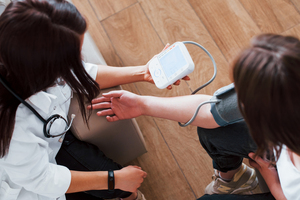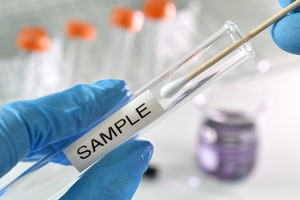Thyroid Test near me
in Boron, CA
Own a clinic? Add your location.
Help patients book appointments with you on Solv. It's free!
0 instant-book locations
Bruin Geotechnical Services
Bruin Geotechnical Services
Foundation Laboratories
Foundation Laboratories
Own a clinic? Add your location.
Help patients book appointments with you on Solv. It's free!
Boron Thyroid Tests
A thyroid test is a blood test that determines your body's thyroid hormone levels.
Thyroid hormones are important for managing your weight, body temperature, and mood, as well as how your body consumes energy. Too much or too little thyroid hormone can lead to a range of health problems, including weight gain or loss, anxiety, insomnia, hair loss, and constipation, to name a few.
You may need a thyroid test if you have one or more symptoms of hyperthyroidism or hypothyroidism. Hyperthyroidism causes anxiety, increased heart rate, weight loss, and sleeping problems. Hypothyroidism causes fatigue, constipation, hair loss, and weight gain, among other things.the complete testing process takes no more than 15 minutes.
A thyroid test does not require any preparation, and there are no significant risks. Minor discomfort or bruising on the finger or arm where blood was extracted may occur in some people, but this usually goes away within minutes.
When it comes to evaluating your thyroid levels, the TSH thyroid test is usually the first step. Based on the findings of the TSH test, your doctor may recommend or perform other thyroid tests, such as the T4 test, T3 test, or thyroid antibodies test, to diagnose or rule out particular thyroid issues. Imaging procedures such as CT scans, ultrasounds, and nuclear medicine may be required to detect or rule out thyroid issues.
If you have a thyroid problem, your doctor will notify you.
Thyroid Test FAQs
How much does a thyroid test cost in Boron?
A thyroid test can cost anywhere from $0 to $200, depending on factors like health insurance coverage, copay amount, and testing rates set by the provider. The number of tests you have and where you live might also affect the cost of thyroid testing. Contact the thyroid test provider directly to learn more about testing fees.
Does insurance cover thyroid testing in Boron?
Many health insurance coverage includes thyroid testing, especially if your doctor requests it based on your symptoms and health condition. However, you may be required to pay the copay. By calling your insurance provider directly, you may confirm your coverage and if thyroid testing is covered by your health plan.
Who should get a thyroid test in Boron?
Anyone experiencing signs of an underactive or overactive thyroid should get a thyroid test. Underactive thyroid symptoms include weight gain, constipation, and irregular menstrual periods (hypothyroidism). An overactive thyroid can cause weight loss, a rapid heart rate, and anxiety (hyperthyroidism). Talk to your doctor about obtaining a thyroid test if you have one or more of these symptoms.
How do they test your thyroid?
Thyroid function can be checked with a simple blood test. During the test, a healthcare professional will take a little sample of blood from your arm and deposit it in one or more test tubes or vials. After that, your blood is examined in a lab to see if you have hypothyroidism, hyperthyroidism, or another thyroid-related health issue.
How should I prepare for a thyroid blood test?
A thyroid blood test does not require any preparation. You may need to fast for many hours before your appointment if your doctor is performing other blood tests at the same time. Ask your doctor or the thyroid test provider whether there are any special precautions you should take in the days and hours leading up to your appointment.
What is the thyroid blood test called?
Thyroid-stimulating hormone (TSH) testing is a form of thyroid gland blood test. Thyroid blood tests include thyrotropin tests, T4 tests, T3 tests, and thyroid antibody tests. T4 and T3 tests can be used by your doctor to diagnose hyperthyroidism. Thyroid antibody levels are tested in a thyroid antibody test to assist your doctor in determining if you have Graves' disease or Hashimoto's disease. Your thyroid blood test provider can provide you with further information about your thyroid blood test.
How long does it take to get thyroid test results in Boron?
Thyroid test results can take anywhere from a few hours to several days to arrive, depending on how quickly the lab can process your sample. Some labs will call your doctor to inform them of the results, so you may have to wait. Other thyroid testing providers may contact you directly with their findings as soon as they are available. Contact the test provider directly to find out when you can anticipate your results.
Where should I get a thyroid test in Boron?
Thyroid exams are available from a variety of healthcare professionals, including primary care doctors, urgent care facilities, and walk-in clinics. Inquire with your primary care physician if they offer thyroid testing or if they can refer you to someone who does. You may also use Solv to locate top-rated thyroid test providers in your area who can see you the same day or the next day.
What can affect thyroid test results?
The findings of thyroid tests can be altered by a variety of factors, including pregnancy, medicines, and certain medical conditions. High-dose biotin, corticosteroids, and diabetic medications, as well as regular hormonal changes that occur during pregnancy, can all affect thyroid test findings. Many doctors consider these factors while doing a thyroid test, and they may ask questions about your current health and medical history to find potential anomalies and irregularities that could lead to inaccurate test results.
Can I do at-home thyroid testing?
Thyroid tests for at-home usage are available online or at a variety of pharmacies and drugstores. These treatments usually include pricking your finger to get a blood sample, which you can then send to a lab for evaluation and diagnosis. At-home thyroid testing can cost anywhere from $30 to $200, depending on the type of test you purchase. They'll walk you through the test and inform you where to mail your blood sample.

Updated on Nov 25, 2025
Solv has strict sourcing guidelines and relies on peer-reviewed studies, academic research institutions, and medical associations. We avoid using tertiary references.
Related Searches
Blood Test in Boron
Diagnostic Test in Boron
Flu Test in Boron
Glucose Test in Boron
Lab Tests in Boron
Pregnancy Test in Boron
STD Testing in Boron
Strep Test in Boron
TB Test in Boron
Aetna Urgent Care
Blue Cross Blue Shield Urgent Care
Cigna Urgent Care
COVID-19
Flu
United Health Urgent Care
» All services in BoronFind thyroid test
Nearby cities
Everyday Healthcare, Simplified
Expert advice to help you live your best life









